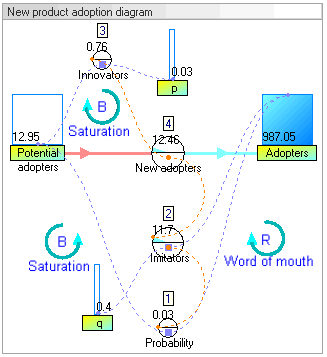Systems thinking
- Introduction to Systems Thinking
- Systems Thinking Tools and Techniques
- Systems Thinking in Organisations
Systems Thinking Tools and Techniques
System Dynamics Modelling Tools

Study of non-linear complex systems.
System dynamics is a powerful approach for understanding the behavior of complex systems over time. It deals with internal feedback loops and time delays that affect the behavior of the entire system. What makes using system dynamics different from other approaches to studying complex systems is the use of feedback loops and stocks and flows. These elements help describe how even seemingly simple systems display baffling nonlinearity.
Introduction to System Dynamics
System dynamics is a methodology and mathematical modeling technique for framing, understanding, and discussing complex issues and problems. Originally developed in the 1950s to help corporate managers improve their understanding of industrial processes, system dynamics is currently being used throughout the public and private sector for policy analysis and design.
Role of Computer-Based Modelling in Systems Thinking
With the advent of powerful computers, system dynamics modelling has become more accessible and practical. Computer-based modelling allows for the simulation of complex systems and the exploration of how changes in one part of the system can impact the whole. This can be particularly useful in organisational settings, where decisions in one department can have far-reaching effects.
Basic System Dynamics Software
There are several software tools available for system dynamics modelling. Some of the most popular include Stella, Vensim, and AnyLogic. These tools provide a visual interface for creating models, making them more accessible to those without a background in mathematics or programming. They also include features for running simulations and analysing results, providing valuable insights into the dynamics of the system being studied.
Applying System Dynamics Modelling to Real-World Problems
System dynamics modelling can be applied to a wide range of real-world problems. For example, it can be used to model the impacts of policy decisions in government, the dynamics of supply chains in business, or the spread of diseases in public health. In each case, the model can help decision-makers understand the potential impacts of their choices and explore different scenarios.
In conclusion, system dynamics modelling is a powerful tool in the systems thinker's toolkit. By allowing for the simulation and analysis of complex systems, it provides valuable insights that can inform decision-making and policy design.